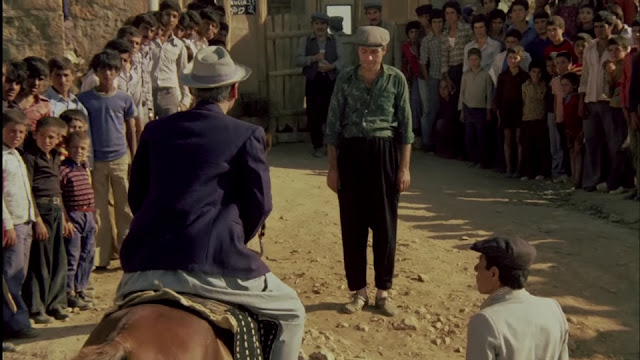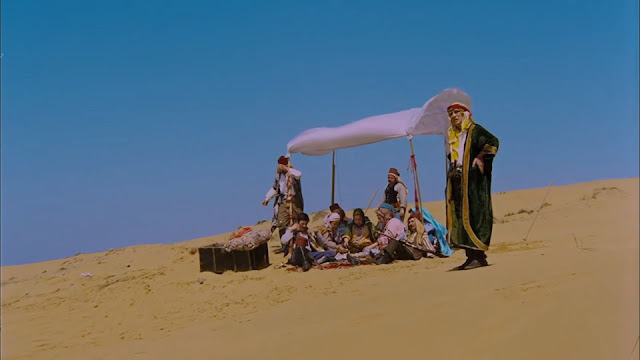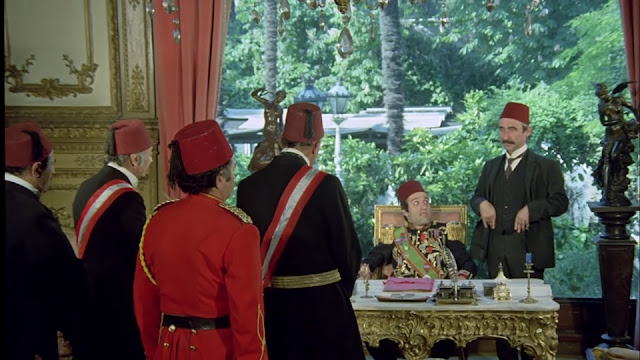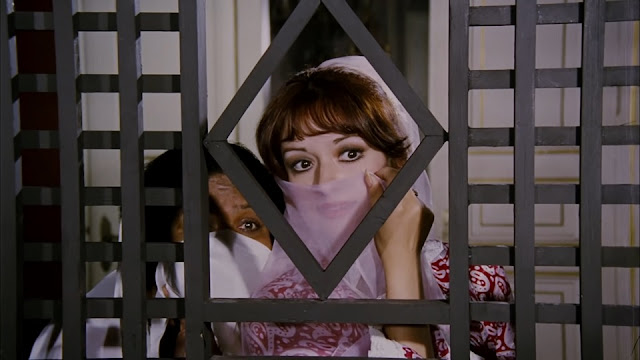It's the perogative of Americans to remake everything they can, even
if it's already in English. Often maddening, this is one of their most
annoying habits, and sure enough they eventually made their own version
of UK genre-bending classic Life on Mars. How does it stack up? Is it
just as bad as you might be afraid of, or could it actually be half-decent?...
Sam
Tyler is a by-the-books cop who's on the hunt for a serial killer when
he's hit by a car and wakes up in 1973. He's confused by his setting,
and thinks everything's all a hoax at first, until his new police chief
Gene Hunt beats some 'sense' into him. Keeping quiet until he figures out
what's going on, Sam continues doing what he does best-Police
work, but now in a very different era, where norms are different, and history is being made...
It
was in 2009 when the US remake of Life on Mars aired on Aussie TV. I'd
already seen some of the original, though was more familiar with Ashes
to Ashes. While the original was on the ad-free ABC, the remake had all the saturation commercial tv
can muster, and I temporarily got sick of the song from all the times I
heard it in the ads! I was a little skeptical of the idea, but curious to see
what it was like, and checked it out, seeing the whole series as it
aired, until its cancellation after only one season.
While
LoM US gets a bad rap from some, I thought it was a pretty good show!
In its own right it handled the concept decently, and the writing is
pretty good throughout. It's your average mid-2000s police procedural,
though with a bit more character to it than the endless letters of CSI,
SVU, and so on.
While
the show does mine the original for material, it isn't bereft of its own stuff, and is at its
strongest when doing its own thing with the premise, in the way an
American show could but the British one couldn't. Such as Sam realising he's in the past when he sees the World Trade Centre
(which manages to totally outclass the changed British skyline of the
original). There's also a more US based civil rights episode, and a gay one done well, like when Ray
is dismissive over 'just another' gay bashing until an angry Gene tells him he's still a cop,
and has a duty no matter what. I also liked the change to one story where the policewoman who's wounded is Gene's younger sister (daughter?). It gave a nice added layer of depth.
Although there are times when the changes are for the worse. Case in point, the serial killer
from the first episode. The way the past and present tie together in the
UK version is a dark twist at the end, whereas the US version goes out of
its way to give Sam a few heart-to-heart moments with the young kid to
apparently cure his possible sociopathy and stop him becoming a serial
killer in the future.
Of
course, the show is also at its weakest when doing new things. Take for
example the bizarre and anticlimactic severed head storyline, where a plot thread about this world's reality
is explained when a random tall guy with red skin pops up to just say
"Oh yeah, that guy made fun of my height so I chopped off his head" only
like 10 minutes in. It makes no sense, and feels like an editorial mandate to wrap-up this thread before it goes anywhere.
While
predominately serious, LoM has its fair share of comedic moments, some
from the original, many new. One I liked was when Same sees a flash of
someone wearing a Nirvana shirt, and when he points this out Annie
just comments that eastern spiritualism is getting more popular these
days. Then there's the amusing way Sam and others spook a homophobic
criminal about jail.
The
characters are fine. Sam Tyler is a good lead, likeable, empathetic, and a
by-the-books cop with a more modern outlook than his new colleagues. While in the past he meets his parents, with his father having a sinister role to play in some cases, as well as an emotional meeting with his mother, who he introduces himself to as "...Luke
Sky...Walker". Dude! You could've just gone with Luke Skye! Or hell,
just say your real name, since it says so on the badge, and go "What a coincidence!".
Gene Hunt is everything you'd expect. A bit of a brutish caveman, with a somewhat loose sense of the law, but with a strong sense of honour. He may not like you, but by god he'll do everything to help you out. The mix of his more old-school and at times thuggish approach contrasts well with Sam's modern perspective, and the two share good chemistry, which is the linchpin of this series.
Annie is a spunky gal, and develops the closest friendship with Sam, leading to a will they-won't they situation. He also gets a stupendously lucky feel of her heartbeat, leading to an amusing comment from her.
One
element missing for LoM US are the easter eggs from 1970s British TV culture, like test card
girls, Jackanory, Camberwick Green, etc. This remake is just plopped in a more
general past, where you know it's the 70s because it's tinted a slight shade
of yellow and every man has a handlebar moustache. While this a shame, I
do get why. British and US media landscapes were very different. There were probably weird little public access products,
programs, and bumpers, but they might only be regional, so a viewer from
Texas might point and go "Oh, I get that!", but literally everyone else
in the US would be baffled. It's been said that unlike England, which
is much smaller and tighter knit, America is too big to know itself.
And
now we come to the most controversial aspect of Life on Mars US-The
ending! The UK version ended by design only two short seasons in, with a
powerful ending that let things remain ambiguous, and it's a great note
to end on! The US version though explains away everything! We
find out exactly how Sam Tyler was sent into the past, who Gene Hunt and
co. really are, everything! I was so mad about this when it first aired, as were
many others. Typical bloody Americans, lacking any kind of subtlety,
can't leave a thing unexplained!
However,
only a couple of years later, something happened which would mellow my
opinion-Ashes to Ashes, the LoM sequel, ended, also definitively
explaining away the nature of Gene's world! In a different, and many
would say better way, but it explains the mystery all the same! So on
those grounds I guess I can't judge LoM US too harshly.
What
I can judge though is the execution, and there are a few little
details, good and bad. Starting with the good, the fact that this
cancelled series had the time to actually give us an ending at all is
very much appreciated! No cliffhanger or loose ends! The lead-up is all
great stuff too, from Sam and Annie's romance, to Sam admitting his true
name to his mother, him sticking up for 1973 and its denizens to the
mystery voice on the phone, and his emotion in the last scene with Gene.
All punctuated with the brilliant musical choice of Elton John's Mona
Lisa's and Mad Hatters. No David Bowie, yeah, but that could admittedly
be an obvious choice.
As for the bad, I'm not saying this is a terrible
explanation, but a lot of it is a bit muddled, and may not hold up to
scrutiny. The double twist is mind-boggling, and many smaller
details may make you scratch your head. The final scene with Gene in 1973 is weird,
like we're missing several pages of script. The writers also took the
show's title far too literally! Same for the name Gene Hunt. The reveal
also completely invalidates everything that's come before, in 1973 and
2008. Despite all this though, that final shot of a regular shoe stepping
onto the surface of Mars is a brilliant one, and could even hold a hint
of ambiguity.
The
cast here do fine jobs. Jason O'Mara is a good lead, getting across all the personality he needs
to. Harvey Keitel is in a way the true lead, and embodies the character of Gene Hunt perfectly! It's neat seeing a film actor willing to 'slum it' in television, and he does great. Gretchen Mol is gorgeous, with a sense of sweet charm to her, Michael Imperioli has fun and the goofier hairstyling, while I presume Johnathan Murphy does a
fine job. And all of the guest actors do well.
Just
like its predecessor, LoM US has a great period soundtrack, full of
classics! The visuals are also spot on too, with some great imagery. The
yellow colour palette may annoy some, but it's possibly not overdone.
Overall,
Life on Mars US is a pretty good remake, that suffers from a few
American hangups, but it's still a good time for the most part, and a
fair remake! The original is recommended over this of course, but this is worth checking
out if you feel like it, and at pretty much the same episode count as
the British version, plus the allure of an ending that gives definite
closure, it's not a bad investment at all...

















































